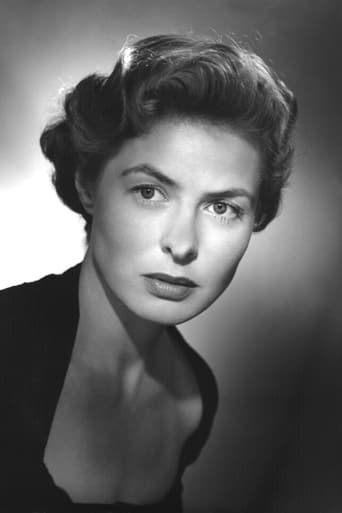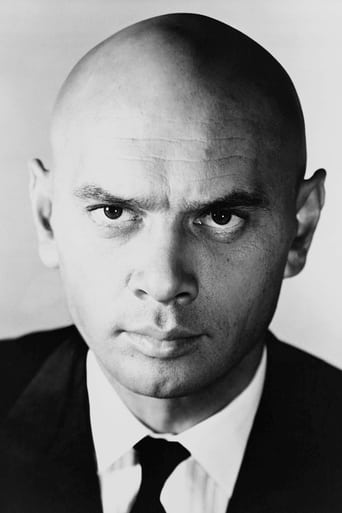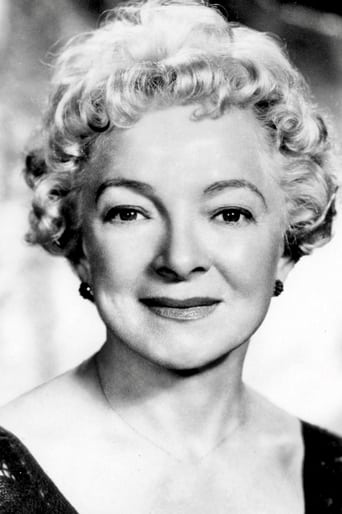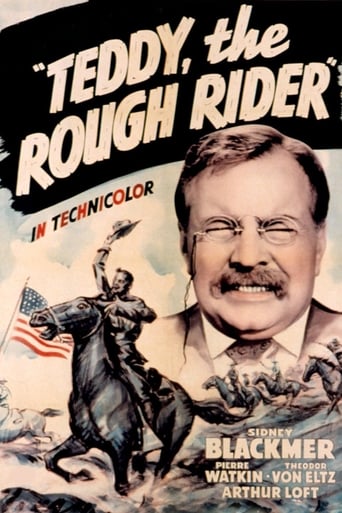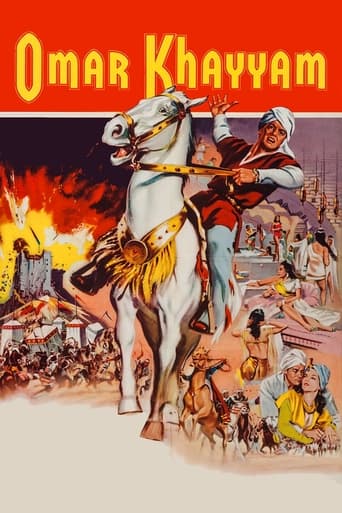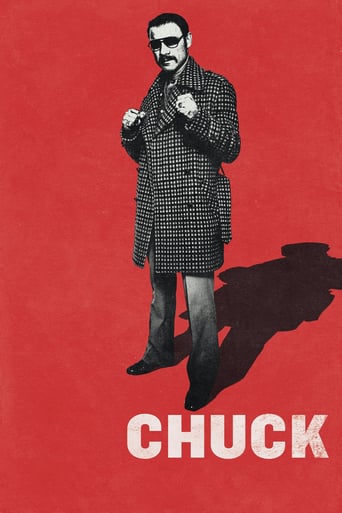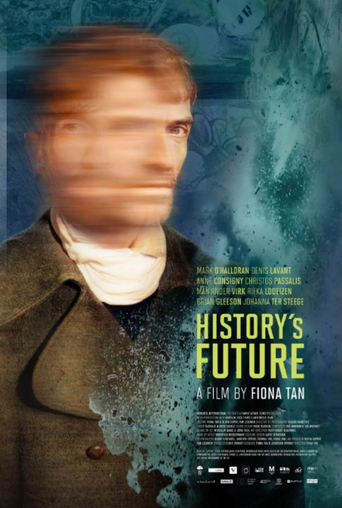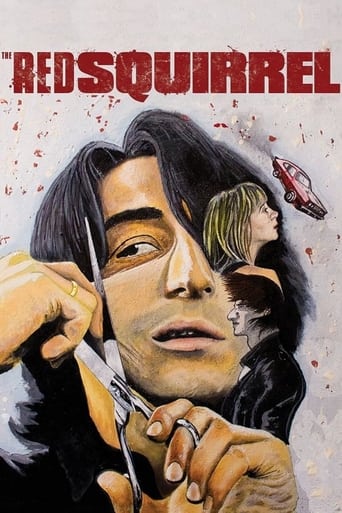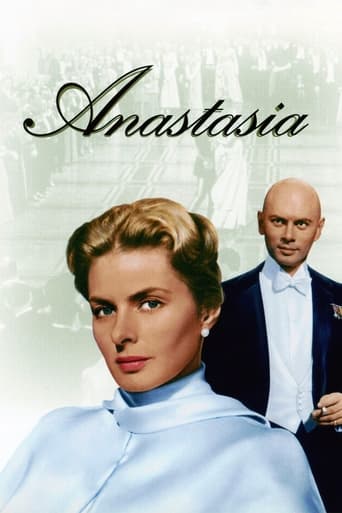
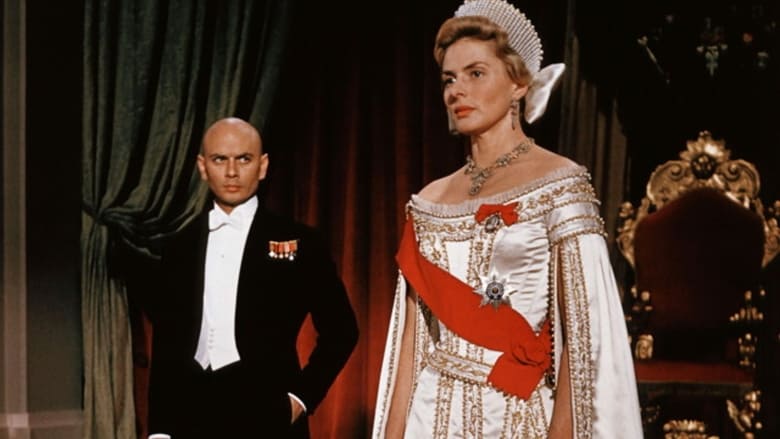
Anastasia (1956)
Russian exiles in Paris plot to collect ten million pounds from the Bank of England by grooming a destitute, suicidal girl to pose as heir to the Russian throne. While Bounin is coaching her, he comes to believe that she is really Anastasia. In the end, the Empress must decide her claim.
Watch Trailer
Cast
Similar titles
Reviews
Purely Joyful Movie!
When a movie has you begging for it to end not even half way through it's pure crap. We've all seen this movie and this characters millions of times, nothing new in it. Don't waste your time.
All of these films share one commonality, that being a kind of emotional center that humanizes a cast of monsters.
The film never slows down or bores, plunging from one harrowing sequence to the next.
Most of us know little about Russian history with much of it happening prior to the Communist takeover given little attention. We hear about Rasputin and Nicholas and Alexandria but not much, at least not as much as with other royal families. The only other story to receive much attention was that of Anastasia, the supposed lost daughter of the royal family who escaped execution and survived. Or did she? Many came forward to claim they were Anastasia but none as famous as Anna Anderson. Here story was the basis for this film and several others. Her claim to be the long lost daughter lasted for decades and it wasn't until DNA results confirmed or denied her claim that the results were determined. But what we have here is a story that revolves around that possibility.Yul Brynner, fresh from his successes with THE TEN COMMANDMENTS and THE KING AND I, stars as General Sergei Pavlovich Bounine, a Russian exile in Paris of nefarious character who will do anything to possess power and money. Displaced as he is we get the impression he is not above criminal activity and has been searching for just the right person to pass off as the long lost Anastasia.It seems he has found the perfect foil for his plan, a woman who had a past involving a stay in an asylum, Anna Koureff (Ingrid Bergman). Something in her background makes it seem that she could potentially actually be the woman sought, but the odds are against it. With a bit of training and assistance Bounine intends to pass Anna off as the real thing and as a result lay partial claim to £10 million laying in an English bank, leftover funds from the royal family.The only way to accomplish this is to pass Anna off as Anastasia to the Dowager Empress Marie Fedorovona (Helen Hayes) in Copenhagen. Hers is the determining factor that will decide if Anna is in fact Anastasia or not. With so many having tried to lay claim to the title it will not be an easy task.But we have more going on here underneath the surface as Hollywood is want to do. As Bounine trains Anna the pair become close to one another. Beneath his brusque manner and treatment of Anna and her confusion as to whether or not she is who he has told her, an affection begins to grow. It's subtle, nearly not on display, but there all the more time they spend together. Whether or not the end result will involve them as a couple is in doubt but the chance is there.The movie is not quite a romance but evolves into one coupled equally with the historical retelling of the search for Anastasia. This blending of fact and fiction makes for a slow moving film but an entertaining one at the same time. The film marked a comeback of sorts for actress Bergman who had fallen out of favor due to the strict moral at the time. Having had an open affair with director Roberto Rossellini in 1950 she had been denounced and looked down upon in American society. But her talent shown through and she worked her way back into the public eye with films like this one.Once more Twilight Time has done an excellent job with the transfer on display here. I've yet to see anything delivered from them that has fallen short. And like all of their titles this one is limited to so many copies so if you're interested get one before they're gone.
What a wonderful movie!!!! They simply don't make them like this anymore. Start with the most mundane matters, the production values. The glorious wide screen aspect ratio is a delight, as is the wonderful Technicolor process, which gives us a vividness that is sorely lacking from movies nowadays. The great Alfred Newman wrote the score. Then consider the acting - first rate on all fronts. Yul Brynner and Ingrid Bergmann play beautifully off each other, and Akim Tamiroff shines in the type of role he excelled in, the sweaty, seedy, slightly comic con artist. Martita Hunt is wonderful as the slightly loony lady in waiting. Helen Hayes is off the charts as the Empress Dowager, in what was evidently a comeback role for her. To watch her display her ambivalent emotions as she deals with what could be her long-lost granddaughter are a revelation. Finally, the script; it impishly refuses to engage the central question - was Anna Anderson really Anastasia, or an impostor? By the end, the question doesn't seem to matter, so beautifully has the script dealt with things like lost hopes, wishful thinking, doubt, deceit, treachery, nostalgia for a lost world, romance, and amnesia. Don't miss this great story, beautifully told in a lavish production.
Bergman bagged her second Oscar as a disturbed woman who may or may not be the only member of the family of Tsar Nicholas II to have survived execution. She's good, not great. The Oscar may have been a reward for her return to Hollywood after seven years of exile. As a brash Russian figure (it's not clear why he has title of General) who goes around barking commands at others, Brynner seems to be doing a variation on his Oscar-winning role in "The King and I" from earlier the same year. Although this film boasts the Best Actor and Best Actress Oscar winners for 1956, the best performance is given by Hayes as a Danish empress. In fact, the film drags until she shows up.
Wonderfully charismatic Yul Brynner, and a 'reborn' Ingrid Bergman making her reappearance in Hollywood after years in exile star in this slightly odd film, a fantastic reworking of an original true story. Anna Anderson (Bergman), sick, amnesiac and slightly mad, is brought from the brink of self-destruction in 1920s Paris to dubious life by a group of mercenary, cynical exiled White Russians led by General Bounin (Brynner). As they groom her to convince their fellow exiles that she is the Grand Duchess Anastasia, rumoured to have escaped the firing squad that destroyed the rest of the Tsar's family, Bounin's feelings about his and her 'part' in the 'play' become more complicated. There's an interesting mix of things going on here: great, clever script, strong cast, hot leads, but something doesn't quite gel so that you're left (or at least I was) wanting just a little bit more than you get. I'm used to seeing Yul Brynner generate chemistry with any actress he plays opposite so I was surprised to hear, and see for myself, that in this film the sparks only fly in the script. But also, the whole, wordy film was shot in a terribly 'British' way (I can get away with saying that!) the camera is almost always too far away to get that incredible intimacy of shot and reaction-shot which is so much a part of screen chemistry. The great Helen Hayes makes up for it amply as "Grandmamma", the Dowager Empress whose belief in Anna's addresses is crucial to the whole enterprise and whose tired face, and withering one-liners, usually aimed at her marvellous lady-in-waiting, form the chief humour of the piece. But close-ups of Anna and Bounin are as rare in this film as hen's teeth: at crucial charged moments between them (when Anna is petulant, drunk, when he is jealous, letting slip that he has started to care), the camera is on the other side of the room, watching with all the indifference of a translator. Incomprehensible try Brynner and Deborah Kerr in "The Journey" only three years later for exactly the kind of close-up driven chemistry I mean and with very different results from the slightly chill effect here. Granted, Brynner's cynical character in "Anastasia" is correctly summed up by Bergman's as "vodka cold, hard, sharp" but even a cold, hard, sharp man can fall in love surely this is precisely the dramatic opportunity that's been thrown away? A typical example: Bounin has whisked Anna off back to their suite, cutting short a romantic encounter with exactly the man Bounine wants her to be with; she drunk on champagne, he impenetrable and just a shade jealous. She calls drunkenly to him from her room and, from a fly on the wall position in the central suite, we see him, slowly, respond to her calls. He doesn't know that she's already fallen asleep: what, then, is he walking towards as he stalks into her bedroom with his catlike, dancer's grace? The sexual charge is lost en route to the distant, static camera: like being in the 'gods' at the theatre, you know that something exciting is going on down there, but you can't make it out.Rant over; the story is intriguing and well-played, despite the real Anna Anderson's claim having been firmly discredited now. Bergman seems quite literally to be acting to save her soul as indeed she was begging her passage back to a hypocritical Hollywood, which must have been pretty galling. But I think Bergman is better in "The Inn of the Sixth Happiness", and Brynner, under-used here, is better in "Invitation to a Gunfighter" and the excellent "The Journey".
